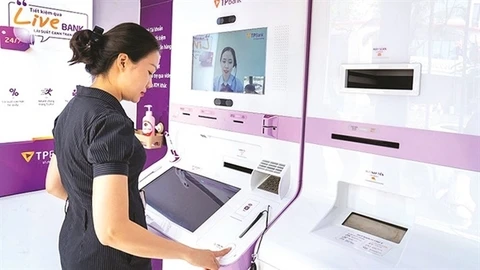HCM City (VNA) – Last week, the State Bank of Vietnam decided to put Saigon Joint Stock Commercial Bank (SCB) under special control and revamped the bank’s management to help the bank stabilize its operation, but analysts said the recent problem at SCB does not have any potential consequences on the banking system.
Michael Kokalari, chief economist at VinaCapital, said there is no potential system consequence from the recent events as evidenced by the facts that there have not been runs at any other banks in Vietnam, and the inter-bank market has continued to function normally since the SCB news emerged. He also cited Bloomberg news as reporting that the S&P banking team opined that the risk from this event is limited to the individual bank and that “we do not expect a material impact on our sovereign credit ratings on Vietnam.”
In a recent report, analysts of VNDirect Securities Corporation also held that recent negative information and fluctuations have put pressure on the banking system’s liquidity, but the risk to liquidity is not significant for many reasons.
“Firstly, the authorities’ efforts to combat the ‘dollarisation’ of the economy and increase cashless transactions during the period have yielded remarkable results.
“According to our observations, people’s confidence in the banking system has been strengthened, while the habit of hoarding cash has decreased remarkably, helping the system's liquidity,” said the report.
Secondly, macro-stability and the health of the current banking system have greatly improved. Currently, nearly 20 commercial banks have been recognised as meeting Basel II standards, of which six banks have completed all three pillars. In addition, the ratio of short-term capital and medium- and long-term loans decreased to 34% on October 1 and will decrease to 30% from October 1, 2023.
In the third quarter, many banks continued to record positive business results despite the fluctuations on the financial market. Insiders said the banking sector may face some risks in the short term, but the long-term outlook remains positive.
According to VinaCapital, in the short term, worries over the banking sector may come from slight margin pressure due to higher funding cost and slower adjustments in lending rates in part due to the government’s call to limit the rate of increase in lending rates.
Besides, perceived risk to asset quality from corporate bonds that are potentially unable to be refinanced, rolled over or re-paid amidst slightly tighter issuance requirements (and possibly shaken confidence in future bond issuances).
However, VinaCapital is of the view that Vietnam’s banking sector remains attractive.
“In the long run, the banking sector continues to hold high appeal due to its high margins, well controlled asset quality, low penetration rate of mortgage and retail loans, and rising incomes (i.e Vietnam is still at an early stage of economic development, so the country’s banking sector is nowhere close to a high maturity stage),” according to the chief economist at VinaCapital./.
Michael Kokalari, chief economist at VinaCapital, said there is no potential system consequence from the recent events as evidenced by the facts that there have not been runs at any other banks in Vietnam, and the inter-bank market has continued to function normally since the SCB news emerged. He also cited Bloomberg news as reporting that the S&P banking team opined that the risk from this event is limited to the individual bank and that “we do not expect a material impact on our sovereign credit ratings on Vietnam.”
In a recent report, analysts of VNDirect Securities Corporation also held that recent negative information and fluctuations have put pressure on the banking system’s liquidity, but the risk to liquidity is not significant for many reasons.
“Firstly, the authorities’ efforts to combat the ‘dollarisation’ of the economy and increase cashless transactions during the period have yielded remarkable results.
“According to our observations, people’s confidence in the banking system has been strengthened, while the habit of hoarding cash has decreased remarkably, helping the system's liquidity,” said the report.
Secondly, macro-stability and the health of the current banking system have greatly improved. Currently, nearly 20 commercial banks have been recognised as meeting Basel II standards, of which six banks have completed all three pillars. In addition, the ratio of short-term capital and medium- and long-term loans decreased to 34% on October 1 and will decrease to 30% from October 1, 2023.
In the third quarter, many banks continued to record positive business results despite the fluctuations on the financial market. Insiders said the banking sector may face some risks in the short term, but the long-term outlook remains positive.
According to VinaCapital, in the short term, worries over the banking sector may come from slight margin pressure due to higher funding cost and slower adjustments in lending rates in part due to the government’s call to limit the rate of increase in lending rates.
Besides, perceived risk to asset quality from corporate bonds that are potentially unable to be refinanced, rolled over or re-paid amidst slightly tighter issuance requirements (and possibly shaken confidence in future bond issuances).
However, VinaCapital is of the view that Vietnam’s banking sector remains attractive.
“In the long run, the banking sector continues to hold high appeal due to its high margins, well controlled asset quality, low penetration rate of mortgage and retail loans, and rising incomes (i.e Vietnam is still at an early stage of economic development, so the country’s banking sector is nowhere close to a high maturity stage),” according to the chief economist at VinaCapital./.
VNA

























